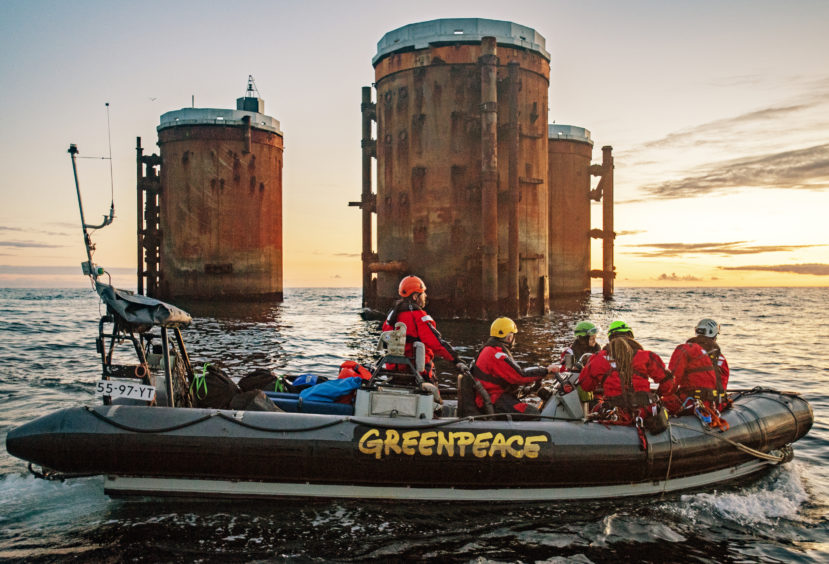
A boss at Shell has insisted that leaving the huge concrete legs of the Brent platforms at sea was the “right thing to do”.
Chief financial officer Jessica Uhl said she “appreciated the sensitivities” around the issue, but hoped the “strong fundamentals” of Shell’s plans would “come through”.
Earlier this month, Greenpeace activists protested against Shell’s intention not to remove the legs of three of the platforms from the North Sea.
The Anglo-Dutch company submitted its decommissioning programme in 2017, but has yet to receive formal approval from the UK Government, which has the final say on whether to grant a permit for “derogation”.
The UK is one of 15 signatories of the Ospar Convention for protecting Europe’s marine environment, which requires companies to leave a clean seabed at the end of a field’s production life.
But permission to leave infrastructure in place can be granted if companies can show removal would be more harmful to the environment.
Shell believes the concrete legs of the Brent field are prime candidates for derogation, as they were not designed with removal in mind.
The UK Government intends to grant a permit, but has been in consultation with other Ospar members.
Germany and the Netherlands, among others, are worried about the contents of the 64 oil storage cells within the legs – each the size of Nelson’s column – seeping into the sea.
Oil within the cells is not free flowing in water but attached to sediment within the concrete cases.
As part of the consultative process, a meeting between governments on the subject was held in London earlier this month.
At the conclusion of the gathering, Ospar said the UK would engage in further discussions before making a final call.
Read more: Shell Brent decom ‘compromise’ possible, says Germany
On Shell’s plans, Ms Uhl said: “The process is overseen and coordinated by the UK Government. Of course, we’ve been deeply involved and engaged over the last decade to help define the right way to manage the decommissioning of these assets.
“We’ve worked with scientists, NGOs and experts to develop these plans and we believe what is proposed is the right thing to do from a safety perspective; that it’s environmentally sound and technically achievable and the responsible thing to do.
“We remain committed to what we believe is the right way of managing the decommissioning and are supportive of the UK Government’s efforts. It’s not in our hands, but I think it’s being managed effectively.
“I appreciate the sensitivities, but given the breadth of work that has gone into our plans, and the critique, criticism, review and challenge of the last ten years, we think it’s the right and sound thing to do.”
Asked whether Shell was hopeful of ultimately getting permission for derogation, she added: “In terms of whether that happens or not, we will manage as we need to manage. It’s difficult to speculate, but we hope the fundamentals of what we proposed and the strength of those fundamentals will come through.”
THIRD QUARTER RESULTS
Weak “macroeconomic conditions” have created uncertainty around the schedules for some of Shell’s key objectives, the firm warned yesterday.
Chief executive Ben van Beurden said Shell’s intention to buy back at least £19.3 billion of its shares and reduce gearing to 25% “remained unchanged”.
But he said challenging conditions could slow down the “pace” of Shell’s buyback programme as well as its gearing reduction efforts.
When crude prices plummeted during the most recent downturn, Shell paid dividends in the form of additional shares, rather than cash.
But in November 2017, with the market on the mend, Shell vowed to cancel its scrip dividend programme and start repurchasing shares.
Yesterday, Shell launched the next tranche of buybacks of up to £2.1bn by January 27 2020.
The business has bought back £9.3bn in shares since the programme’s launch, initially slated for completion by the end of 2020.
Shell’s gearing, or net debt as a percentage of total capital, was 27.9% in the third quarter.
Yesterday, Shell became the latest oil major to bemoan lower oil and gas prices in its quarterly results, following BP and Total earlier in the week.
Crude prices were driven down by concerns about the impact of trade tensions between China and the US, and oversupply in the gas market.
Current cost of supply earnings, Shell’s preferred performance measure, totalled £3.7bn in the third-quarter, down 15% year-on-year.
Oil and gas production dropped 1% to 3.56 million barrels of oil equivalent (boe) per day, mainly due to divestments, weaker operational performance and higher maintenance activities, offset by field ramp-ups.
Pre-tax profits came to £6.46bn, a decrease of 14%, while revenues fell 11.8% to £69.2bn.
Recommended for you

